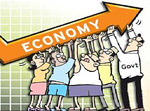During a CB’s session on April 12 the CB board decided to increase the refinancing rate by 0.25% and defined at 8.5%. This decision does not support the economic activity. We will try to find out why economists think that increased refinancing rate presses down economic activity. For example, you have some money and you want to invest in some business. For such investment you are expecting 15% profitability per year. However, before you would invest in any business the bank interest rates grow to the extent of exceeding this limit and reach 16 or 17%. In such situation you will not invest in any business as it will be highly risky, and instead of that you can simply deposit that money in a bank and receive interest rates without any efforts. Let’s discuss another example. You want to start a business but do not have money for that. Again you are expecting 15% profitability. However, if banks are offering 15% interest rate, there is no reason to borrow money from a bank and start a business. This is the reason why increased interest rates press down the economic activity. In case of Armenia, in addition to such high interest rates small and medium businesses can receive short-term credits only, and after starting their business in some time they find out that they are out of money and they meet bankruptcy. The refinancing rate is the milestone that makes the final interest rate limits offered by banks. In other words, with this tool the CB influences on the interest rates in the market. The more the refinancing rate is increased, the higher the interest rates offered by banks are.
This is the CB’s main tool to fight inflation (in addition to the minimum capacity of obligatory reserves). The CB may not care about if it is good or bad for the economy because according to the law its main function is controlling inflation. By the way, according to the law the issue of inflation is more important for the CB than the other issues.
The CB cannot cope with the inflation alone; they need help. The CB officials openly say that they are not able to cope with the inflation alone. “The Board finds that starting from the beginning of 2011 the restriction of monetary conditions, the tax policy influence on the formation of common demand, the assistance of state institutions in implementing anti-crisis policies will result in realistic opportunities to bring the level of inflation to the targeted level in the second part of the year,” writes the protocol of the CB session.
The other state institutions are trying to help the CB and each of them is doing something for this purpose. The government is trying to cut down the budget deficit and is taking a bill to the parliament to define the list of products, for which they need to establish fixed price for 90 days, and these are the products the prices of which will increase by 30% within one month. The parliament supports the fight against the inflation by approving this bill. The ARF’s recommendation to increase the pensions and aids was delayed (or in fact rejected), which is again done for the purpose of fighting inflation. The MPs from the ARF and coalition powers say in their private conversations that the reason is the lack of resources, but definitely the reason is connected with inflation as well. Increasing pensions and aids means to increase the capacity of money in circulation, which will increase the demand as well. It is against the CB’s efforts to cut down the capacity of money in circulation.
It is absurd, because the government is trying to resist the inflation to enable people survive, but on the other hand they do not give money to people to be able to buy something to eat. This means that the final goal of this policy is not increasing the well-being of people but showing the right inflation rate as they have planned before.
If it is really about the inflation rate but not the inflation itself, the national statistics service can help the government with this. Even though the main goal of this institution is not influencing on inflation but publishing statistics about it, they have found the solution how to influence on inflation. “The inflation rate in March 2011 was 0.8%. Even though the re-evaluated level of inflation based on the new basket of consumer products has reduced the 12-months rate in March, it is still high and has reached 11.5%,” writes the CB statement.
The national statistics service calculates the level of inflation based on 470 types of products, where each product has its capacity. This time they have changed the method of calculation of inflation by reducing the capacities of petroleum and bread. Of course people will not consume less bread but as the price of bread has increased, the portion of this type of product in calculation of the inflation level has grown. In a word, as a result of this small statistical trick the inflation rate is reduced by almost 1% even though the prices have not gone down. We should give credits to the staff of our statistics services because what they are doing is a “know how” and the statistics services of other countries can use this trick to change the inflation rates in their countries as well.
After all these things, we are sure that in the end of the year the official statistics will report approximately 6% inflation. In other words, both the sheep will stay alive and the wolves will not be hungry. And again the people will be the ones to suffer from all these processes.

